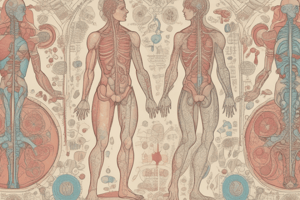Podcast
Questions and Answers
Which of the following is a characteristic of endocrine glands?
Which of the following is a characteristic of endocrine glands?
- They have ducts and release enzymes into the blood
- They have ducts and release hormones into the blood
- They lack ducts and release hormones into the blood (correct)
- They lack ducts and release enzymes into the blood
What is the current scientific definition of hormones?
What is the current scientific definition of hormones?
- Nutrient chemicals acting as intracellular messengers produced in trace amounts
- Non-nutrient chemicals acting as extracellular messengers produced in trace amounts
- Non-nutrient chemicals acting as intercellular messengers produced in trace amounts (correct)
- Nutrient chemicals acting as intercellular messengers produced in large amounts
What type of coordination do hormones provide?
What type of coordination do hormones provide?
- General coordination for continuously regulating cellular functions
- Special kind of coordination for continuously regulating cellular functions (correct)
- General coordination for temporarily regulating cellular functions
- Special kind of coordination for temporarily regulating cellular functions
How do endocrine and neural systems coordinate and regulate physiological functions?
How do endocrine and neural systems coordinate and regulate physiological functions?
What distinguishes the endocrine system from the neural system in terms of coordination?
What distinguishes the endocrine system from the neural system in terms of coordination?
Flashcards
Endocrine glands
Endocrine glands
Glands that release hormones directly into the bloodstream, without using ducts.
Hormones
Hormones
Chemical messengers produced in trace amounts by endocrine glands, acting as intercellular signals.
Endocrine system coordination
Endocrine system coordination
The endocrine system coordinates and regulates physiological functions through slower but longer-lasting actions of hormones.
Neural vs. endocrine coordination
Neural vs. endocrine coordination
The nervous system uses rapid electrical signals (neurotransmitters) while the endocrine system uses slower-acting chemical messengers (hormones).
Signup and view all the flashcards
Joint coordination
Joint coordination
The nervous and endocrine systems work together to control and regulate the body's functions.
Signup and view all the flashcardsStudy Notes
Endocrine Glands Characteristics
- One characteristic of endocrine glands is that they produce and secrete hormones directly into the bloodstream.
Definition of Hormones
- Hormones are defined as chemical messenger molecules that are produced by endocrine glands and transported through the bloodstream to reach their target cells, tissues, or organs.
Hormone Coordination
- Hormones provide endocrine coordination, which is a type of coordination that involves the transmission of signals through chemical messengers.
Endocrine-Neural System Coordination
- The endocrine and neural systems coordinate and regulate physiological functions through a complex interplay between the two systems.
- The endocrine system regulates slow, long-term changes in physiological functions, while the neural system regulates rapid, short-term changes.
Endocrine vs Neural System Coordination
- What distinguishes the endocrine system from the neural system in terms of coordination is the type of signals used (chemical messengers vs electrical impulses) and the speed of transmission (slow and long-term vs rapid and short-term).
Studying That Suits You
Use AI to generate personalized quizzes and flashcards to suit your learning preferences.




